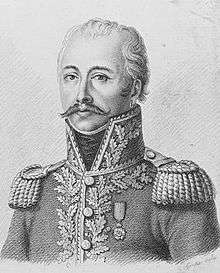Antoine Guillaume Delmas
Antoine-Guillaume Maurailhac Delmas de La Coste Delmas (3 January 1766 – 30 October 1813) was a French Revolutionary and Napoleonic general.[1]
Antoine-Guillaume Maurailhac Delmas de La Coste Delmas | |
|---|---|
 Antoine Guillaume Delmas | |
| Born | 3 January 1766 |
| Died | 30 October 1813 |
| Nationality | (in French) |
| Occupation | Military Commander |
La Coste Delmas was born in Argentat, Corrèze, France on 3 January 1766. He was mortally wounded at the Battle of Leipzig and died on 30 October 1813 in Leipzig.[1]
His name is inscribed "DELMAS" on the east pillar of the Arc de Triomphe.[1]
Early Military Experiences
At age eleven,[2] he joined the regiment of Touraine and fought in the American war (this regiment, led by the Caribbean fleet and commanded by Admiral de Grasse, participated in the siege of Yorktown in October 1781). But his fiery temper soon threw him into disfavor despite the affection of his colonel, the Vicomte de Mirabeau. He was forced to leave the regiment in 1788.
The Revolutionary Wars
Unanimously chosen in 1791 to command the 1st battalion of the Volontaires de la Corrèze, he quickly gained a brilliant reputation in the army of the Rhine, where, one day, he went to seize a standard in the heart of the enemy's cavalry, killing with his own hands two hussars who defended it, and carried it back to the applause of all the vanguard troops. His skill and courage soon earned him the rank of brigadier general and command of all the infantry in the army's vanguard.
Sent to Landau, Delmas was there threatened with dismissal by the representative of the people and, denounced by the Jacobins of that city, he managed to defend himself. Upon lifting of the siege, he went to fight in the line at Kaiserslautern. The Jacobins clubs of Spire renewed the denunciations of Landau. He finished his work gloriously on the field of battle, was made prisoner and taken to Paris; but the army soon reclaimed him.
Returning as the head of a division and reconnoitering the city of Bois-le-Duc, its fortifications screened by marshes and flood, he suddenly found himself in front of Fort Orthen, having discovered a gap in the palisades and sensed a wavering on the part of the garrison. Then he said to his officers and eight hussars who were with him: "My friends, the fort is ours; who loves me follows me." Spurring on his horse, he leaped the ditch, scaled the parapet and was the first to enter the fort. The 50 men who defended it, surprised by such audacity, were sabred, driven beyond the walls, and pursued onto the outer rampart which the general ordered shelled by the divisional artillery, firing from within Fort Orthen. This vigorous action led to the surrender of Fort Crevecoeur.
Towards the end of 1796, Delmas command a division in the Army of the Rhine under the command of Moreau. He returned to France after a serious injury, went on to the Italian army, in the Battle of Tyrolese, took over from Joubert as commander-in-chief and held the post until the arrival of Scherer.
He covered himself with glory and served brilliantly at the Battle of Magnano. The Director had offered him the command of the 1st Division (Paris), which he refused, the government presented with a suit of full armor in testimony of his brilliant services. He then returned to Italy as a lieutenant commander in chief.
Consulate and the Napoleonic Wars
In 1801 he took command of the troops in Piedmont. He was exiled for ten years because in 1802, attending an ostentatious Te Deum, First Consul Bonaparte asked his opinion about the ceremony, and Delmas replied "Beautiful capucinade. The only thing missing is the million men who died to abolish all this."[3]
He offered his sword to the Emperor in 1813, fighting with the same courage and was mortally wounded in Leipzig.
Notes
- Jensen 2013 cites Six 2003
- Bulletin de la Société scientifique, historique et archéologique de la Corrèze, Volumes 90 à 91
- La Révolution française pour les nuls - Alain-Jacques Czouz-Tornare (FIRST page 344)
References
- Jensen, Nathan D. (2013), General Antoine-Guillaume Maurailhac Delmas de La Coste Delmas, arcdetriomphe.info External link in
|publisher=(help) - Six, Georges (2003), Dictionnaire Biographique des Généraux & Amiraux Français de la Révolution et de l'Empire (1792-1814) (in French), Paris: Gaston Saffroy